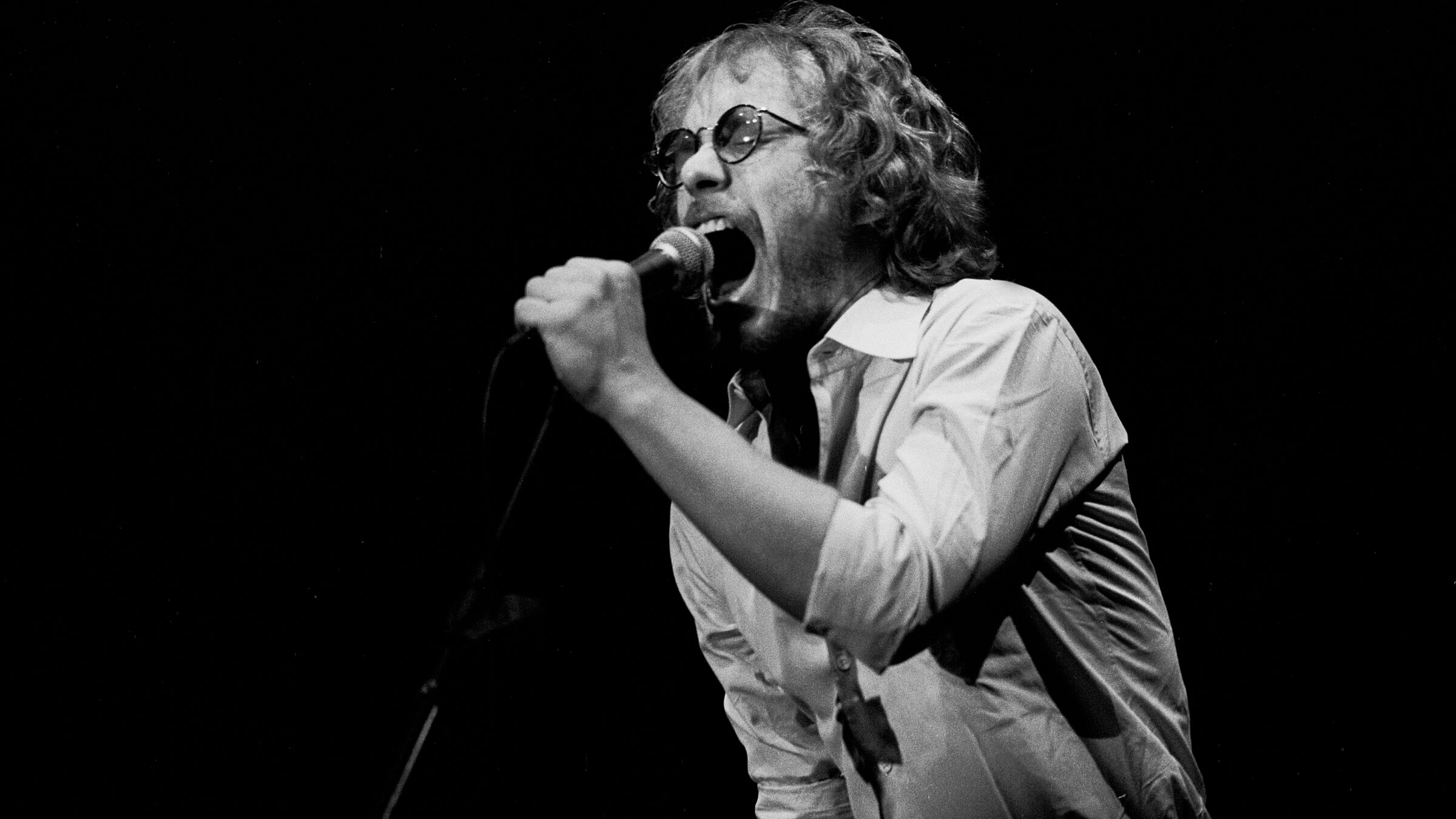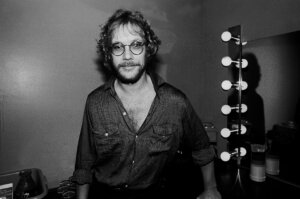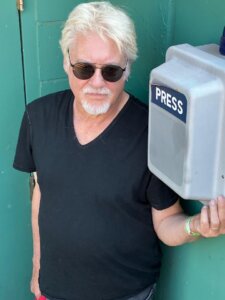How Warren Zevon overcame his demons to become a sandwich-enjoying rock’n’roll prophet
One of the best-read singer-songwriters of his time recovered from alcoholism while holding onto his morbid sense of humor

Warren Zevon performs at Chicago’s Park West in 1982. Photo by Getty Images
The first time I met Warren Zevon was after a show he and his band did in May of 1978 at Boston’s Berklee Performance Center. I was a rock critic for the Bangor Daily News, down from Maine to cover two emerging talents, Zevon and Elvis Costello.
Costello’s show was riveting and intense; Zevon’s was kind of fun, but sloppy and Zevon was, as they used to say, in his cups. Those cups of clear liquid he’d been drinking weren’t water.
At the time, Zevon was riding high behind his second solo album for Asylum Records, “Excitable Boy,” and its improbable novelty hit single, the bloody three-chord romp, “Werewolves of London.” Zevon’s wit carried him through some of the haphazardness. He was an excitable boy — and a witty, intelligent one. “Part of my guitar style is playing loud and out of tune but spiritedly,” he quipped.
But the overall performance was messy. His songs, so charged with emotion and energy on record, were rendered tepidly. For a singer who appeared to have so much to offer, he couldn’t deliver the goods. And seemed hardly to care. We met up briefly, post-show. It was friendly, but awkward. The next time we talked, it was 1980 and I was doing a phone interview for the Boston Globe. By that point, he’d gone the 12-step AA route. I mentioned the Berklee gig. He didn’t recall it, of course, but said of my assessment, “Yeah, that figures.”
I asked Zevon when he knew he’d hit rock bottom. He said he’d told his then-wife Crystal that he wanted to go see Bruce Springsteen in concert.
She informed him he’d already done so. “That was it,” Zevon said. “It was a scary thing, but you’re real lucky if the gorge rises and the self-disgust gets to a sufficient cinematic kind of thing where you know that you’re an asshole.”
Zevon checked into a California facility and underwent a month-long intensive detoxification program. “They do that intervention therapy,” Zevon said, “where they casually walk you into a room and there’s everybody you know in the world. Each one of them has prepared a statement about all the times you were drunk, how they didn’t want to tell you what an ass you made of yourself and how you imperiled everybody around you. But they’re there because they believe in you. It has a pretty staggering effect.”
From the late ‘70s through the early ‘90s, when he was riding semi-high, Zevon often toured with a full band. That was when he and his record company could afford it and the crowds turned out. Later on, without the financial backing, and his audience at what might be termed “cult level,” he’d play solo club shows — just him with an acoustic-electric guitar and grand piano. He’d play a gig at a Boston club and then schlep up to Maine to play a ski lodge.

I got to know Zevon pretty well through those decades, reviewing and interviewing him for the Globe. In the fall of 1989, I had lunch with him at Musso & Frank, the hip Hollywood eatery where he was a regular. We settled in at our table. The waiter came and we ordered beverages, a Diet Coke for him, a beer for me .
“Oh shit, I’m sorry,” I blurted out, alarmed. Should I not have done that?” (You know, maybe not good form to have an alcoholic drink in front of a recovering alcoholic.)
Zevon paused for a few moments. Not unusual. Zevon often took time to think before responding. It could sometimes be unnerving if you didn’t know him well. He fixed me with a squinty, wry look. “Yeah, Jim,” he growled. “A decade of sobriety out the window because you’re having a beer.”
I had Zevon’s home phone number and sometimes we’d just talk. No interview involved, no tour to promote, just conversation, his observations often laced with oblique references and ironic humor. We talked a lot about books and writing. He was the most well-read rocker I ever knew and his taste was eclectic and sublime — Ross MacDonald, Graham Greene, Ernest Hemingway, Stephen King, Hunter S. Thompson, Thomas Pynchon, many more.
But he had a different number in 2002 and I couldn’t reach him after his mesothelioma, a rare cancer of the membrane around the lungs was made public. I reached out through his publicist and she passed on my message of empathy and conveyed the message that I’d love to speak with him. We didn’t connect, but I understood. He had other people, an inner circle of loved ones who were much more part of his life.
Zevon died Sept. 7, 2003, at 56. Although his father William Zevon was of Russian-Jewish lineage, “he did not want any kind of a Jewish service,” his ex-wife-but-friend-til-the-end, Crystal Zevon. told me when I was writing on the 10th anniversary of his death.
“To my knowledge and relationship later on in his life, he didn’t have any real relationship to religion at all,” Jordan Zevon, Warren’s son, told me last week.
After his death, Jordan and his sister Ariel, with their spouses, sailed out in the Pacific Ocean and scattered their father’s ashes.
Zevon wrote a fair number of death-related songs over the years, including a semi-autobiographical one called “I’ll Sleep When I’m Dead” on his major label debut album “Warren Zevon.” It’s a rollicking, crescendo-laden rocker about proudly living the reckless life now and worrying about consequences later. In the recorded version, he sang, “I’ve got a .38 special up on the shelf/If I start acting stupid, I’ll shoot myself.”
In concert, after sobriety in the ‘80s, there was a change: “I’ve got a .38 special up on the shelf/And I don’t intend to use it on myself.” One of the key components of Zevon’s music, as well as his personality, was his ability to intertwine humorous and serious matter — and leave you unsure which side was up. The listener – or Zevon’s conversation partner – couldn’t always be sure where he stood. And perhaps Zevon couldn’t either.
I once asked him about “Play It All Night Long,” a stomping rocker about an incestuous Southern farm family that kept playing “Sweet Home Alabama” as a comforting soundtrack. It’s black-humored, as it touches upon the plane crash that killed singer Ronnie Van Zant and two bandmates. Was it funny?
“Well, it is funny, but it’s also not funny,” Zevon said. “Like it’s not intended as a ridicule of Lynyrd Skynyrd – I don’t think it’s funny that rock bands get killed in plane crashes — but then the grim, crazy stuff is funny and the overall effect is scary. It’s ambivalent.”
At any rate, death was part of our conversation. In that 1989 interview, Zevon was discussing his then-current album “Transverse City,” and he described it as “cheerily morbid.” While fans often looked to Zevon for humor, he said; “I think we [musicians] all agreed it should be unremittingly grim. Let’s take grim all the way – not like ‘We’re kind of sad, but trying to cheer you up.’ If it’s not funny anymore – too bad.”
So, it didn’t seem particularly morbid that I asked him about his future obituary. I was hardly prescient, but thought there could be a chance that one day I’d be writing it. (I did.) I asked Zevon how he thought that obit would begin.
“Ow-oooh,” he immediately offered, deadpan, echoing the werewolf’s call in his biggest mainstream hit. That simple, catchy rocker would be the inevitable first reference to his life’s body of work. “Just three chords over and over and over,” he said with a sigh, joking (or not) that “it took as long to write as it did to play it.”
But he wasn’t complaining. “Maybe,” he mused, “you don’t want to die and have it say, ‘This guy wrote some really sensitive, intellectual, literate songs that put everybody to sleep — this was one pretentious guy.'”
Of course, Zevon did write sensitive, intellectual, literate songs, too. Lots of them, like “Desperados Under the Eaves,” “Hasten Down the Wind,” “Splendid Isolation” and “Let Nothing Come Between You.” But he put no one to sleep and was not in the least pretentious.
“As a writer,” he told me, “It’s a danger to exaggerate your own emotions and we do that, but it’s probably a greater danger to hide from them or conceal them. … I realize how personal what I’m saying is, but I don’t know any other way of doing it.”
In 2007, Crystal’s biography, “I’ll Sleep When I’m Dead: The Dirty Life and Times of Warren Zevon” hit the stores. The title was truthful. There was a lot of unsavory detail, much of it relayed by friends and acquaintances. He was a sexaholic when he was on the road and there was a verbally combative, vicious side to Zevon I did not know about, (Well, we did have one good dust-up over whether a quote he gave me and I printed was off the record or not.)
“Warren, at his core, had a super sense of morality,” Crystal said. “I think for him it was almost like going into the confessional, in order to leave cleanly. He studied artists and read biographies and he found the process of artful creation from a philosophical standpoint something he studied all his life. Why would someone cut their ear off? I think he felt there might be value in [his biography]. I suppose there was an element of narcissism to it, but I think Warren knew that he had a genius IQ and had a certain talent and if that was ever recognized, he felt it was important for the person who was behind that to be recognized for who he was — the torment, the cost, I guess.”
The Boston production team of Sean Slade and Paul Q. Kolderie did Zevon’s 2000 album, “Life’ll Kill Ya.” “Working with Warren was really interesting,” Slade told me, “because Paul and I, after a week or so, realized that within five minutes of him walking through the studio door you could tell whether you were going to get the good Warren or the bad Warren.
“The good Warren was amazing, witty, fun, the greatest guy you’d want to hang out with,” Slade told me. “The bad Warren was fiendish, hostile, argumentative and basically an asshole. And he completely admitted to that, that it was part of these weird demons that he was battling.”
“It had to do with headaches,” added Kolderie. “He claimed to have these blinding migraines and whenever he was in the middle of one of those he was in a terrible mood.”
On Oct. 30, 2002, Zevon appeared on “The Late Show with David Letterman” for the last time. He’d been on the show more than a dozen times and was, in fact, the perennial fill-in bandleader whenever Paul Shaffer was away. Zevon was Letterman’s favorite musician and in an unprecedented move, that night Zevon was the only guest. Zevon played three songs – “Mutineer,” “Genius,” and Letterman’s favorite, “Roland the Headless Thompson Gunner” and chatted on the couch. Zevon called the appearance “meaningful fun,” and thanked Letterman profoundly for doing so much to keep his career alive over the years, after radio had lost interest.
Asked to give advice to others as he faced his own mortality — what did he know that we didn’t? — Zevon paused and said: “Enjoy every sandwich.” That phrase became iconic.
https://www.youtube.com/watch?v=z7Mirkd3CT4
“He was such a gifted guy,” novelist Carl Hiassen and one of Zevon’s closest friends told me in 2010. “Larger than life. When we would talk in his last year, he said, ‘This is gonna be a lot harder on you than it is on me,’ and he meant all of us who cared about him. He said, ‘I went to bed so many times not knowing if I was gonna wake up. Look at it like this: I got to be Jim Morrison a lot longer than he did.’ It was a great way of looking at it. The amount of talent was so daunting, his brainpower. He was sometimes his own worst enemy, but he was in many ways a genius.”
When he could see the final curtain about to fall, Zevon co-wrote with Jorge Calderon and gathered a lot of his famous friends to help him make his last album, “The Wind.” Zevon was a musician’s musician and his sidemen and collaborators over the years included Springsteen, Don Henley, Dwight Yoakum, Jackson Browne, Ry Cooder, Tom Petty, Mike Campbell, Emmylou Harris and Joe Walsh.
“The Wind” included the sweet, gorgeous ballad “Keep Me in Your Heart.” Sang Zevon, “Shadows are falling and I’m running out of breath/Keep me in your heart for a while.” (The opening line would seem to be a nod to Bob Dylan’s “Not Dark Yet.”) It’s all any of us could hope for — not eternal fame or love everlasting. Just for your memory to linger for a while in someone’s heart after yours has stopped beating.
“The Wind” also included a cover of Dylan’s “Knockin’ on Heaven’s Door,” perhaps the most un-ironic song Zevon ever recorded. The resonance was obvious.
Did he believe in an afterlife?
“Warren was always seeking,” Crystal told me. “He thought about it a lot. He did believe there was something.”
After Zevon’s cancer had been made public, Dylan started covering several Zevon songs in concert – “Accidentally, Like a Martyr,” “Boom Boom Mancini” and “Mutineer.”
“He loved Dylan and Dylan was a big fan of Warren’s,” said Hiassen. “Warren was sick and Dylan was doing a show in California. He invited Warren because he was going to do ‘Mutineer’ in concert.”
Zevon attended and met with Dylan beforehand but couldn’t make it through the whole show. He was sick. Hiassen got a voice mail afterwards: “He goes, ‘Well, I just got covered by Bob Dylan. That’s a sure sign of doom.’”






















